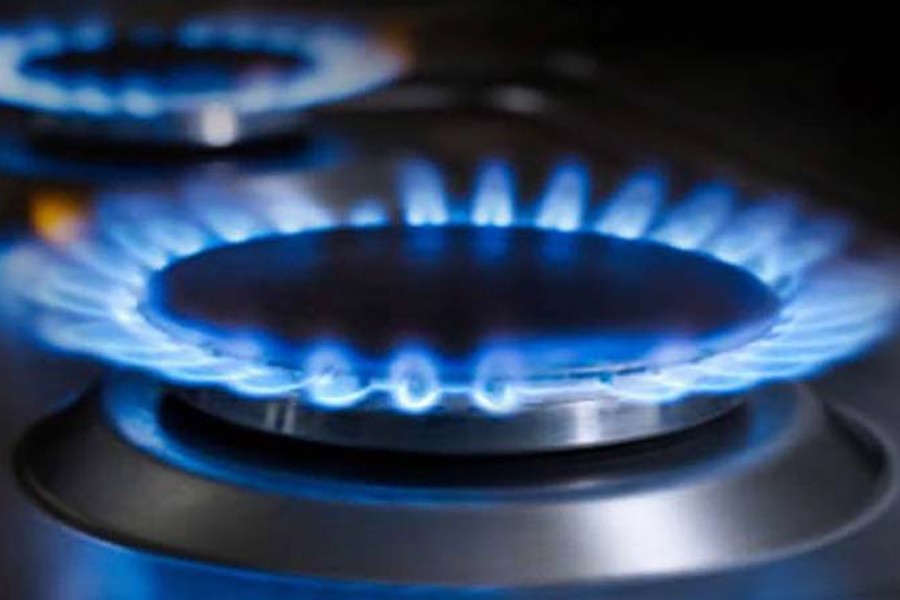Gas relief on US regasification unit resurrection
Imported LNG processing at Excelerate FSRU peaks soon

Published :
Updated :

Coveted relief for gas-guzzling consumers comes with the US floating terminal in the bay resuming Thursday LNG processing after a two-and-a-half-month hiatus that fed into fuel crisis across Bangladesh.
The Excelerate Energy-owned floating storage and regasification unit (FSRU) went for overhauling and capacity-expansion works on November 1, 2023, leaving a lone domestic company-owned one in operation.
"The floating storage and regasification unit (FSRU) named Excellence is now re-gasifying around 200 million cubic feet per day (mmcfd) of LNG," Petrobangla chairman Zanendra Nath Sarker told the FE Thursday.
He hopes LNG regasification from the FSRU will pick up gradually, following the soft landing after a revamp.
With the capacity expansion Excellence's current LNG-regasification capacity has got ramped up to around 170,000 cubic meters with send-out capacity of 600mmcfd from its previous capacity of 138,000 cubic meters and send-out capacity of 500mmcfd.
Excellence's resumption, however, coincides with another FSRU's de-plugging move from the Moheshkhali mooring facility for scheduled overhauling and maintenance.
Bangladesh's second FSRU, operated by local Summit LNG Terminal Co Ltd, a subsidiary of Summit Group, will cease re-gasifying LNG within next couple of days, said Mr Sarker.
But Petrobangla intends to regasify up to 8.33-percent more LNG or up to 650mmcfd until resumption of Summit's FSRU after carrying out overhaul in order to remedy the ongoing natural-gas crisis in Bangladesh, he said.
Summit's 3.75-million-tonne-per-year-capacity FSRU is now re-gasifying the remaining LNG with the vessel, he said. The FSRU is set to reinitiate re-gasifying LNG after 45 days.
This will be Summit FSRU's first overhauling since initiation of commercial operation on April 30, 2019.
However, after initiation operation, Summit FSRU's operation had halted for around three months since November 2021 following rupture with its mooring line from the mooring system.
The Excelerate FSRU had to re-gasify 10-percent more than its official capacity at 550mmcfd then to cope with the short supply of natural gas, according to official data of Petrobangla.
Summit's FSRU reinitiated LNG regasification on February 28, 2022 after its restoration to life from the technical glitch.
It had to navigate another adversity: its operation had been suspended for a brief period of three days since May 12, 2023 as preparedness to face cyclone Mocha to avoid damage to the FSRU.
Sources say natural-gas crisis is now affecting all sorts of consumers, including industries, power plants, and commercial and household users, resulting in cut in industrial throughput and untold sufferings of the commoners.
"Gas crisis has now turned from bad to worse," says Executive President of Bangladesh Knitwear Manufacturers and Exporters Association (BKMEA) Mohammad Hatem.
Industrial output dropped to 50-70 per cent, he adds about the domino effect of the fuel crunch on the export industry.
Over the past several months, the situation was that, if natural gas is found in some areas in the morning, they are not getting it in the evening. Similarly, if the industries get gas in the evening, they are not getting it in the morning, Mr Hatem laments.
"But, over the past one week, gas supply along with pressure reached almost zero," he says.
The compressed natural gas (CNG) filling stations are also getting much-lower- than-expected gas pressure in most areas, and in some areas, there is no gas, General Secretary of Bangladesh CNG Filling Station and Conversion Workshop Owners Association Farhan Noor has said.
The power plants are also not getting required gas to generate electricity.
Some three dozen gas-fired power plants are now shut, as the state-run Petrobangla could supply around 744mmcfd natural gas to the plants against their demand for 2,240mmcfd according to Petrobangla data as of January 17, 2024.
To pacify vexed consumers, state Minister for the Ministry of Power, Energy and Mineral Resources Nasrul Hamid, however, has assured that the ongoing gas crisis will ease by March when both the FSRUs will be operational.
"Uninterrupted gas supply to consumers could be possible by 2026 when several new long-term LNG suppliers will initiate supplying the fuel under new contracts," he also said.
Until early March, Bangladesh might have to squeeze import of LNG from spot market, the Petrobangla chairman said, with dollar dearth in the backdrop limiting many more imports.
Bangladesh will, however, continue importing LNG from long-term suppliers, he said.
The country's natural-gas output is currently hovering around 2.540mmcfd of which 501mmcfd is regasified imported LNG, according to Petrobangla statistics as of January 17.
Azizjst@yahoo.com


 For all latest news, follow The Financial Express Google News channel.
For all latest news, follow The Financial Express Google News channel.